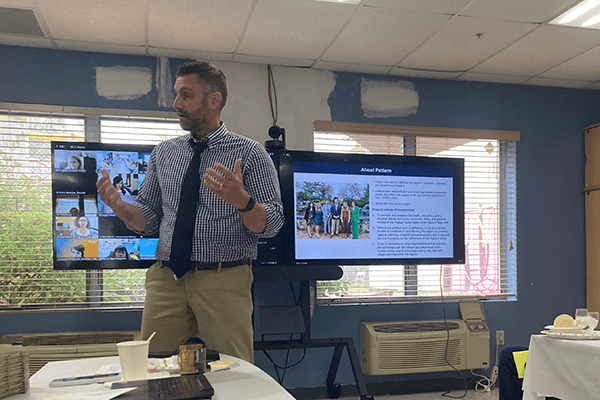|
RCBJ-Audible (Listen For Free)
|
Phillips Airs List of Grievances In Opposition To Affordable Housing Development On Waterfront During Haverstraw Collaborative Meeting in Village of Haverstraw
By Tina Traster
Haverstraw Town Supervisor Howard Phillips does not mince his words when it comes to affordable housing.
“Haverstraw has done its share; the rest of the county should step up,” he said.
Phillips has said it before and he repeated it again with his opening salvo to a 16-minute speech he gave last Wednesday at the Haverstraw Collaborative, a group of nonprofits that meet monthly in the Village of Haverstraw to share common issues concerning people in need. Most of the nonprofits work with people who are rent burdened. Phillips left after his speech; he was unwilling to field questions.
His first visit to the Collaborative in 23 years, Phillips talked about the town’s history of passing rent stabilization for 700 apartments in the 1980s and for “allowing mobile homes to expand as a means of affordable housing.” He said “If you want to empower people, if you want to give them roots in the community, sink the roots deep down into the soil, the best way to do it is to get them to be a homeowner. I don’t care if it’s a townhouse, condominium, or single family. That’s why all of us should be supporting Habitat for Humanity.”
According to its website, Habitat For Humanity Rockland County built a home in Haverstraw in 2019, renovated a home in Hillburn in 2022 and has 2-3 projects scheduled for 2025-26.
Homeownership may be well and good – maybe an ideal — but clearly out of reach for many. When people are rent burdened – spending 30 percent to 50 percent of their income on rent – they are hardly capable of saving for a down payment or qualifying for a mortgage.
“People can’t reach the first rung of home ownership,” said Adam Bosch, Executive Director of the Hudson Valley Think Tank Pattern for Progress, adding increasingly those in distress are people in the middle class. “They are persisting and looking for rentals longer. In the last ten years rents have doubled while wages are stagnant. These are the working people who provide us with goods and services.
“If these people have a medical emergency or need tires changed, it’s a level-five emergency,” Bosch continued, adding that housing affordability is an acute problem in Rockland County and in the region. “They can’t participate in the economy.”
There is a deficit of 4,230 affordable units for those making under $60,000 annually, according to the Rockland County Housing Needs Assessment, prepared by Pattern for Progress. The report says 57 percent of Rockland homes are single-family detached homes – unaffordable to the average resident. The single-family average sales price is $683,000. A median household income of nearly $100,000 can qualify for a $260,000 mortgage. And fewer than 2 percent of single-family homes sold are less than $300,000 according to the 2022 Multiple Listings Service.
The report says 42 percent of the town’s (Town of Haverstraw) residents are housing burdened, while 52 percent of residents in the Village of Haverstraw are spending more than 30 percent of income on housing costs.
Also according to the report, Haverstraw has 327 subsidized units, landing second to last among the five towns. Ramapo leads with 1,781, followed by 665 in Orangetown, and 527 in Clarkstown. Stony Point has the fewest, 89.
Phillips came to the Haverstraw Collaborative to essentially explain why he is not supporting a PILOT (payment in lieu of taxes) for a proposed mixed-income project in the Village of Haverstraw. The Town Supervisor peppered his emotional speech with a fusillade of arguments against more affordable housing in the village or town-wide. To the lineup he added the burden of hiring more police officers, increased traffic, the threat of certiorari lawsuits. He misleadingly said PILOTs add a financial tax burden to property owners without explaining there are economic benefits to new development. He omitted to add the IDA (Industrial Development Agency), which has signed off on a pilot for the Chair Factory site, has shown the benefits of the project make sense. According to a study by the IDA, the local benefits, over $500 million, outweigh the cost 55:1.
Also, projects with PILOTs cannot file certiorari suits — they have waived that right when the PILOT is negotiated. Phillips asserted that signing off on a PILOT for affordable housing would open the town to tax challenges and lawsuits.
Phillips specifically took aim at the proposed 450-unit mixed-income project (70 percent of units will be affordable including set asides for veterans, seniors and those below an income threshold) slated for the former Chair Factory site on the 9-acre peninsula jutting into the Hudson River in the Village of Haverstraw, though he never named the project. The developer was at the meeting.
He began with a comparison of what future property taxes per unit would be after a hypothetical 15-year PILOT versus what similar future property taxes for a 15-year PILOT would be on market rate apartments. He said the former would be $715 versus $1,855 for the latter.
But is this an apples-to-apples comparison or is it too simplistic?
“Every project needs to be measured on its own merit because every project has different costs and revenues,” said Ryan Porter, managing partner of MPact Collective LLC, a Huntington Station, Long Island, a co-developer on the Chair Factory Project. For example, the Chair Factory project includes mixed-income housing, commercial space and bi-level structured parking for the town’s workforce, veterans, and seniors. The plan also calls for floodplain mitigation, and four acres of public parkland. A project like this needs to be evaluated in the context of rising construction costs and economic risks – which means it’s incongruous to reduce an argument down to a comparison of projected property taxes for 2040, especially where the “comparable” project provides no public amenities or benefits.
In contrast to withholding PILOT approval for the Chair Factory project, the Town of Haverstraw this year swiftly signed off on two market-rate developments with PILOTs: BNE’s 300-plus unit luxury development in Letchworth Village and another development for 228 units at the site of the former Oak Tree Bungalow colony. Both developments are in the town’s LA-17 (Luxury Housing) zone and neither will provide affordable units or public amenities. Both are for-profit projects.
Phillips set the tone during the meeting as he defended Haverstraw’s record on “affordable housing” and sought to shoot down the merits of the Chair Factory development. Phillips is the only holdout on the PILOT; the Rockland County Industrial Development Agency and the taxing entities that need to approve the PILOT (the Village, the County, and the School District), have lined up behind the project.
MPact Collective has said it cannot build the $340 million project without a PILOT. Developers need to know the property tax structure for their lenders, public agencies, and tax credit applications to complete their financing applications. This is standard industry practice.
In January, the Rockland County Industrial Development Agency authorized a raft of benefits for the $340 million project, including $1.65 million exemption from mortgage tax recording, an $18.5 million exemption from sales tax, and the approval to participate in a PILOT program. The Westchester-based Westhab Inc., which is planning 81 affordable housing units at 63 Maple Avenue in the village, is also awaiting a PILOT.
In 2021, the Village of Haverstraw released a Request for Expression of Interest (RFEI) for development of two waterfront parcels known as the Chair Factory and Damiani Properties. The Village-owned parcels sit on a peninsula at the foot of Main Street at the widest point of the Hudson River with views of High Tor Mountain, Westchester, and Bowline Point Park.
There were four prospective development teams that vied for the project site. Phillips falsely said the Chair Factory was “the only developer interested in the site.”
Village of Haverstraw Mayor Michael Kohut has viewed the revival of the waterfront and its physical connection to downtown as potentially the village’s crowning jewel. The village has already put some of its $10 million DRI funds to use mitigating the flood-prone site.
Phillips knows he’s at odds with many factions who are pushing for the success of the project. He told Haverstraw Collaborative members, as well as Kohut and the developers who were in attendance, that he did not believe the Chair Factory project would stimulate economic development.
Pointing to the Harbors At Haverstraw, Phillips said, “This has people with very large incomes – many with ten times the income that will exist is these apartment complexes.”
Then he continued: “We’ve seen zero economic benefit from that. Zero. Whether it’s the village or the town. It hasn’t helped the downtown at all.”
It does seem hard to believe that the more than 1,000 residents of the Harbors have not contributed to the local economy, be it the village or the town. Phillips did not offer any specific study to support that claim.
Further, he said, “It’s incomprehensible to believe that people who are going to be on affordable incomes, in this instance, the average medium income…means people are making between $30,000 and $60,000 – it’s incomprehensible to think those people are going to have a major impact, or an impact, on this downtown area.”
It is not an exaggeration to say that statement left people in the room viscerally stunned.
When Bosch began his presentation shortly after Phillips’ comment, the first thing he said was “I guess my mom doesn’t matter. She’s a medical records clerk. She makes $40,000 a year.”
He talked about people working in supermarkets and transportation and home health care – many earning less then $60,000 annually, adding that those with wages under that threshold have backslid, making it more difficult to afford rent, food and transportation. One Haverstraw Collaborative member discussed the hardship of families becoming transient hotel residents because they cannot find affordable places to live.
MPact Collective has said will not purchase the property until the PILOT, and other state and private funding is in place. The developer plans to pay nearly $8 million for the nine-acre site, as well as three to four private parcels it is in the process of acquiring.
It remains to be seen if Phillips’ plan to hold up or quash an affordable housing project by having the Town of Haverstraw deny the developer a PILOT agreement sticks. Or whether the developer can find a workaround to a PILOT. The application continues to sail through the planning board process without opposition.
RCBJ earlier this month reported that Phillips and his board had orchestrated a plan to get the Knights of Columbus to donate its brick building at 56 West Broad Street to the Town of Haverstraw rather than follow through with a two-year negotiation to sell the building to St. Katherine Group of Port Chester for $2.4 million. The developer had promised more than 100 affordable units, space in perpetuity for the Knights, and a parking deck for the Village. The developer was also amenable to allocating space for a senior center. In the meantime, the building, will come off the tax roll and the Town of Haverstraw is paying the Knights $7,000 monthly of taxpayer funds to maintain the religious order. Final approval for the transfer of the property rests with the Attorney General’s Charity Bureau.
Meanwhile, the MPact continues to work for approvals.
“Thank you for the opportunity to engage alongside the valuable insights presented by Pattern for Progress,” said a spokesperson from PennRose, a Brooklyn-based affordable housing developer that’s co-partnering with MPact. “We recognize the concerns surrounding housing affordability and appreciate the Supervisor’s stewardship of the town’s resources.” He added, “The PILOT is essential for fostering a financially sustainable community, which will in turn strengthen the town’s economic dependability and stability over time.”
















